There is a certain magic to drydocks. They give you the ability to take in the whole ship in almost a single look and provide the one chance to get the bottom clean and whatever needs fixing below the waterline fixed. Here is a short video of the Brig Niagra on dock at the Great Lakes Towing Shipyard in Cleveland, Ohio. Thanks to Irwin Bryan and Alaric Bond for passing along the news.
 What is it about ships being towed to the scrap yard? The MT Phoenix under tow, on her way to the scrap yard last July broke her towing cable and drifted ashore on Salt Rocks in Sheffield Beach, South Africa. She was only freed last month and was subsequently scuttled. Last June, the perhaps poorly named MV Wisdom was under tow to a scrap yard when she broke her cable and drifted ashore on Bandra beach, in suburban Mumbai. And two weeks ago , the Canadian Miner, on her way to a scrap yard in Turkey, broke her tow line and ran aground near Scatarie Island, off the coast of Cape Breton, Canada. Mammoet Salvaging, a Dutch salvage company, has prepared a salvage plan and has presented it to Canadian authorities.
What is it about ships being towed to the scrap yard? The MT Phoenix under tow, on her way to the scrap yard last July broke her towing cable and drifted ashore on Salt Rocks in Sheffield Beach, South Africa. She was only freed last month and was subsequently scuttled. Last June, the perhaps poorly named MV Wisdom was under tow to a scrap yard when she broke her cable and drifted ashore on Bandra beach, in suburban Mumbai. And two weeks ago , the Canadian Miner, on her way to a scrap yard in Turkey, broke her tow line and ran aground near Scatarie Island, off the coast of Cape Breton, Canada. Mammoet Salvaging, a Dutch salvage company, has prepared a salvage plan and has presented it to Canadian authorities.
The surf in San Diego county has been putting on quite a light show on recent evenings. The shore has been hit by a bout of “red tide,” a bloom of the dinoflagellate Lingulodinium polyedrum. The bad news is that this dinoflagellate can be toxic to fish and shellfish. The good news is that it is wildly bio-luminescent turning the Pacific waves a soft neon blue as they break on the beach. See our post about red tide in New York harbor around this time last year.
Red Tide – Bioluminescent San Diego, 2011
Thanks to Irwin Bryan for passing the story along.
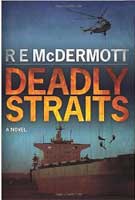 For the sake of full disclosure, I am not a huge fans of thrillers, particularly thrillers involving ships. The plots often strike me as implausible and the descriptions of the ships and ship operations often border on the laughable. (Too often, they leap across the border.)
For the sake of full disclosure, I am not a huge fans of thrillers, particularly thrillers involving ships. The plots often strike me as implausible and the descriptions of the ships and ship operations often border on the laughable. (Too often, they leap across the border.)
This is not the case however with R.E. McDermott’s Deadly Straits. The book is a maritime thriller whose plot is disturbingly plausible. And unlike virtually every other thriller I have come across which features ships, Deadly Straits consistently gets it right. It is a thriller that even a thriller skeptic and ship geek can love.
Continue reading
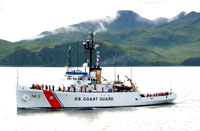 Last March we posted that the U. S. Coast Guard Cutter Acushnet, the oldest commissioned Coast Guard cutter, was being sold in an online auction. The ship was reportedly sold to an unidentified buyer. The ship has now been put up for auction on EBay by “masterbushpilot0.” The “Buy It Now” price has been set at $10,000,000. The current highest bid is $27,100 and the reserve price has not been met. The auction ends in four days.
Last March we posted that the U. S. Coast Guard Cutter Acushnet, the oldest commissioned Coast Guard cutter, was being sold in an online auction. The ship was reportedly sold to an unidentified buyer. The ship has now been put up for auction on EBay by “masterbushpilot0.” The “Buy It Now” price has been set at $10,000,000. The current highest bid is $27,100 and the reserve price has not been met. The auction ends in four days.
HISTORIC USCGC Acushnet Coast Guard Cutter / Diver Vessel UP FOR AUCTION

Marie Didieu's house at Ras Gitau on Manda Island. Photograph: Simon Maina/AFP/Getty Images
Marie Didieu, a disabled 66-year-old French woman, was kidnapped yesterday from her vacation home on Manda Island, part of the Lamu archipelago, not far from where a British tourist was killed and his wife abducted three weeks ago. The kidnappers arrived and departed by speedboat early Saturday morning. They were pursued by Kenyan naval craft but escaped to Somalia.
Continue reading
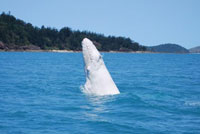
Photo: WAYNE FEWINGS
About 14,000 humpback whales migrated between Australia and Antarctica each year. Among them is a white humpback, nicknamed Migaloo. Migaloo, or “white fella” in an Aboriginal language, was first spotted in 1991 and may be the most popular humpback whale in the world, being the subject of several web sites (see also here and here) and having a Facebook page, (of course) as well as over a dozen Youtube videos. The last official sighting of Migaloo was by a cargo ship crew on August 10 about 10km north of Pipon Island in Far North Queensland, according to the White Whale Research Centre.
Migaloo, who is often referred to as the “only all white humpback whale,” seems to have lost that title ths week as a new white humpback calf has been sighted off Queensland, Australia. The white calf, believed to be just a few weeks old and as yet unnamed, was seen playing with a pod of dark humpbacks near Cid Harbour at the Whitsunday Island. There is no way to know whether the calf is related to Migaloo without DNA testing.
Thanks to Irwin Bryan for passing the story along.
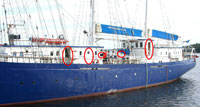
SV Concordia – Open Watertight Doors and Openings Highlighted in Red
We recently posted that Transportation Safety Board of Canada has concluded that poor training played a role in the knockdown and capsizing of SV Concordia. The official Marine Investigation Report examines the events leading up to the capsize in some detail. It is a fascinating report and well worth reading.
How did the ship sink? Contrary to earlier accounts, the Transportation Safety Board found no evidence of a microburst, a sudden and violent downdraft of wind that can reach speed as high as 150 knots. There may have been downdrafts present in the squalls, but nevertheless, the winds in which the ship capsized were no stronger than winds the ship had previously encountered.
Continue reading
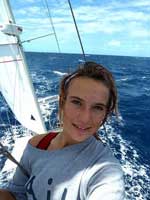 Laura Dekker has celebrated her 16th birthday and has set sail from Darwin, Australia on a westerly course across the Indian Ocean bound for Africa. Given the concern about piracy in the Indian Ocean, her exact route is being kept secret. In 2009, teenage circumnavigator Zac Sunderland was shadowed by a boat which may have been pirates near the Cocos Keeling Islands, which may be along Ms. Dekker’s route. In 2010, Zac’s sister Abby Sunderland’s boat was knocked down and dismasted in the Indian Ocean ending her attempt at solo circumnavigation. Ms. Sunderland attempted to transit the Indian Ocean in mid-Winter whereas Ms. Dekker will be sailing in the southern hemisphere Spring.
Laura Dekker has celebrated her 16th birthday and has set sail from Darwin, Australia on a westerly course across the Indian Ocean bound for Africa. Given the concern about piracy in the Indian Ocean, her exact route is being kept secret. In 2009, teenage circumnavigator Zac Sunderland was shadowed by a boat which may have been pirates near the Cocos Keeling Islands, which may be along Ms. Dekker’s route. In 2010, Zac’s sister Abby Sunderland’s boat was knocked down and dismasted in the Indian Ocean ending her attempt at solo circumnavigation. Ms. Sunderland attempted to transit the Indian Ocean in mid-Winter whereas Ms. Dekker will be sailing in the southern hemisphere Spring.
Laura Dekker, 16, sets sail into piracy-plagued Indian Ocean
Thanks to Irwin Bryan for passing the story along.
 In February 2010, the sail training ship Concordia sank off the coast of Brazil. At the time, the captain said that the ship was hit by a “microburst,” also known as a white squall, a violet storm which struck the ship so rapidily that there was no time to react. A report issued today by the Transportation Safety Board of Canada, however, blamed human error caused by poor training for the capsize and sinking of the ship.
In February 2010, the sail training ship Concordia sank off the coast of Brazil. At the time, the captain said that the ship was hit by a “microburst,” also known as a white squall, a violet storm which struck the ship so rapidily that there was no time to react. A report issued today by the Transportation Safety Board of Canada, however, blamed human error caused by poor training for the capsize and sinking of the ship.
Poor training standards to blame in SV Concordia sinking
Continue reading
 Two hundred and fifty three years ago today, Horatio Nelson was born in in Burnham Thorpe, Norfolk, the sixth of eleven children. He went to sea at 12 on a ship commanded by a maternal uncle. He would become the greatest naval commander in British history, dying in 1805 at the battle of Trafalgar, his great victory, where the Royal Navy soundly defeated the combined fleets of the French and Spanish navies.
Two hundred and fifty three years ago today, Horatio Nelson was born in in Burnham Thorpe, Norfolk, the sixth of eleven children. He went to sea at 12 on a ship commanded by a maternal uncle. He would become the greatest naval commander in British history, dying in 1805 at the battle of Trafalgar, his great victory, where the Royal Navy soundly defeated the combined fleets of the French and Spanish navies.
The Royal New Zealand Navy is also celebrating its 70th birthday. On October 1, 1941, the The New Zealand Division of the Royal Navy became the Royal New Zealand Navy. The 70th Anniversary celebrations will include a visit to Wellington by ten navy ships. Festivities start today and run through Monday. These will not be the only excitement in Wellington this weekend, however. The New Zealand All Blacks will be competing in a Rugby World Cup match against Canada. A Festival of Carnivale will also be taking place as will a “rural weekend” event including sheep shearing, sheep dog trials, sheep racing and wood chopping. Wow. A busy and eclectic weekend indeed.
We recently posted about personal submarines. In browsing around in that market, we came across the “Seabreacher” and thought that it deserved a separate look. The Seabreachers by Innerspace are definitely the most brilliant, crazy, or perhaps a bit of both, personal watercraft out there. They are snorkel fed submersibles which can travel at up to 55 mph on the the surface and around 20 mph just below it. And just for the fun of it, or perhaps merely to mess with the minds of nearby whale watchers, one model looks rather like an orca. Additionally, the “orca” model, Seabreacher Y, can be outfitted with riding pegs and a handlebar attachment to allow a stunt man to ride on the back and perform tricks. The Seabreacher X looks a bit like a shark. The non-orca or shark Seabreachers look like something from a James Bond movie. They also have a “Dolphin” Seabreacher which Innerspace has used as a “a research and development platform ” but is not in commercial production. Prices start at US$ 65,000 for a standard model and at US$ 81,000 for the orca-like Model Y.
Killer Whale Seabreacher Watercraft
[iframe: width=”480″ height=”360″ src=”http://www.youtube.com/embed/7SUHOjnkmlI” frameborder=”0″ allowfullscreen]
Seabreachers are Coast Guard approved as personal watercraft. The manufacturers “strongly recommend that a support boat is present whenever you operate a Seabreacher. This is not as much for the Seabreacher but more to help keep other boaters or water users from coming too close to the vessel when it is operating. We also recommend having radio communication between the vessel and chase boat as an added precaution. We continue to use a support boat every time we go out, even after ten years of operation.”
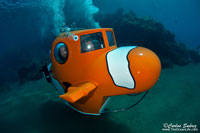
Sport Sub submersible
Slate.com recently recently featured and article, You-Boat, Can you buy your own submarine?. They noted that drug smugglers had their own submarines to sneak cocaine and other drugs north. If they had subs why couldn’t we all own a personal submarine? They then went onto say that, “around $600,000 will get you an entry-level, winged submersible without a pressurized cabin. If you’re willing to spend $2 million, you can buy a two-person submersible with a see-through acrylic dome.” That seemed awfully expensive for a personal submarine. So we decided to do some shopping. You an get started for a lot less than $600,000.
Continue reading

Jamaran Mowj Class multi purpose light guided missile frigate
The Iranian state-run Islamic Republic News Agency reported Tuesday, that Adm. Habibollah Sayari of the Iranian Navy announced that Iran would be sending ships near US waters. Iran is also planning to send ships to the Gulf of Aden to help counter piracy in the region. The interesting question is, what ships do they have to send?
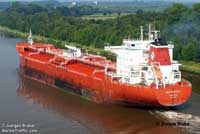
Photo: Juergen Braker
Just over a week ago we posted about the hijacking of the product tanker 45,000 DWT tanker, Mattheos I, with a crew of 23, off Benin in the Gulf of Guinea. Last Saturday, the ship and crew was released. No ransom was paid. The pirates stole as much of the diesel fuel cargo as they could and fled. One crew member was reported to be slightly injured, but otherwise the crew is said to be fine.
Why is piracy inthe Gulf of Guinea so different from piracy off the coast of Somalia?
Continue reading

Photo: John Lee / Aurora Select
When Diana Nyad was stopped by repeated jellyfish stings in her most recent attempt to swim between Cuba and Florida, it brought to mind two articles, one about the discovery of the “immortal jellyfish” and another which raised the question whether the world’s oceans will become dominated by jellyfish.
As global warming and pollution degrade the oceans are we being faced by a jellyfish apocalypse? Consider – on the night of December 10, 1999, 40 million people, abruptly lost power on the Philippine island of Luzon, home to the capital, Manila. Was it a terrorist attack? A coup? No, it was masses of jellyfish blocking cooling lines of a local power plant. An editorial in the Philippine Star noted, “Here we are at the dawn of a new millennium, in the age of cyberspace, and we are at the mercy of jellyfish.”
Almost three miles beneath the surface of the Atlantic, deeper than the Titanic, Odyssey Marine has located the wreck of the S.S. Gairsoppa, which was torpedoed in February of 1941 by a German U-boat. When she sank, the ship was loaded with silver, pig iron and tea. The 240 tonnes of silver aboard are believed to be worth aproximately $200 million (around £155 million.) Odyssey plans to begin recovery operations in the spring which, if successful, will be the deepest and largest retrieval of a precious cargo lost at sea in history.
Shipwreck of SS Gairsoppa discovered with £155m silver haul onboard
Thanks to David Rye, Phil Leon and Irwin Bryan for passing the story along.
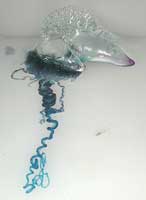 In August, Diana Nyard attempted to become the first person to swim from Cuba to Florida without the aid of a shark cage. She gave up that attempt after 29 hours of swimming when adverse winds blew her off course. Late last week she attempted the swim for a second time but was stopped this time by jellyfish, specifically multiple Portuguese Man o’ War stings. Two thirds of the way through her second recent attempt at swimming from Cuba to Florida, 62-year-old Diana Nyad was advised to get out of the water by her doctors after being stung repeatedly by jellyfish and Portuguese Man o’ War. Nyad had covered about 92 statute miles over the 40 hour swim, two-thirds of the journey from Cuba to Florida, but her doctors were concerned that toxins were building up in her body from the repeated stings.
In August, Diana Nyard attempted to become the first person to swim from Cuba to Florida without the aid of a shark cage. She gave up that attempt after 29 hours of swimming when adverse winds blew her off course. Late last week she attempted the swim for a second time but was stopped this time by jellyfish, specifically multiple Portuguese Man o’ War stings. Two thirds of the way through her second recent attempt at swimming from Cuba to Florida, 62-year-old Diana Nyad was advised to get out of the water by her doctors after being stung repeatedly by jellyfish and Portuguese Man o’ War. Nyad had covered about 92 statute miles over the 40 hour swim, two-thirds of the journey from Cuba to Florida, but her doctors were concerned that toxins were building up in her body from the repeated stings.
A fascinating look at the research of Denise Herzing, who has been studying dolphins in the Bahamas for 25years. Next year she is beginning an attempt to use technology to engage in two way communication with dolphins.
[iframe: width=”480″ height=”373″ frameborder=”0″ scrolling=”no” marginheight=”0″ marginwidth=”0″ id=”nyt_video_player” title=”New York Times Video – Embed Player” src=”http://graphics8.nytimes.com/bcvideo/1.0/iframe/embed.html?videoId=100000001061693&playerType=embed”]

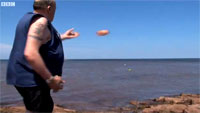 Harold Hackett of Prince Edward Island started throwing bottles with messages inside into the Atlantic Ocean in 1996. Since then he has cast 4,800 bottles into the sea and has received 3,100 responses. He has received letters back from Africa, Russia, Holland, the UK, France, Scotland, Ireland, parts of New England, Florida, Norway and even the Bahamas. His response rate may be better than the average “Friend” request rate on Facebook. Click the link below for a BBC interview of Mr. Hackett.
Harold Hackett of Prince Edward Island started throwing bottles with messages inside into the Atlantic Ocean in 1996. Since then he has cast 4,800 bottles into the sea and has received 3,100 responses. He has received letters back from Africa, Russia, Holland, the UK, France, Scotland, Ireland, parts of New England, Florida, Norway and even the Bahamas. His response rate may be better than the average “Friend” request rate on Facebook. Click the link below for a BBC interview of Mr. Hackett.